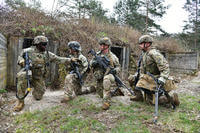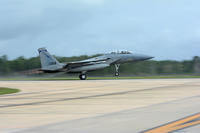A series of changes included in a draft 2016 budget proposal under consideration by the Defense Department could raise commissary grocery prices, reduce store hours and cut employees.
The cuts could be included in the President's 2016 budget set to be released early next month. The proposal is then sent to Congress for changes and approval, likely sometime late this year.
The plans included in the commissary draft proposal are likely to change before being added to the President's final document, sources said.
Defense Commissary Agency (DeCA) officials were tasked by the Defense Department with coming up with a $322 million cut to their current $1.4 billion operating budget, according to the documents labeled "not for release." The proposals were first reported by Army Times.
Here's what the proposed cuts could actually mean for you.
DeCA says it will need to make a series of changes to how the agency operates its stores in order to find $322 in savings. Officials said the agency can save $183 million a year by cutting employees from an average of 51 to 45 per store, closing stores completely on certain holidays during which they currently have limited hours, reducing regular hours and number of days open.
Of the 241 stores, 183 would reduce the number of days they are open, according to the plan.
"Thirty stores would go from being open 7 to 5 days per week; 47 stores would decrease from 7 to 6 days a week; and 106 stores from 6 to 5 days a week," the proposal states.
But the biggest changes, and the final $139 million in savings, would have to come from changes to the legislation that oversees the commissaries and mandate prices that shoppers pay. Those rules dictate the price tags DeCA puts on groceries, whether or not they are permitted to charge for plastic bags, and a myriad of other operating procedures.
DeCA is currently required by law to sell groceries "at cost." As a result, the agency cannot fund any store operations or other projects with sales revenue because the sales only make up for the purchase of the goods. They are also prohibited from collecting additional fees, subcontracting certain management activities, and increasing prices to account for shipment to rural locations.
If the DoD wants to cut DeCA's budget this year - and continue cuts down the road - these rules must be changed, the draft proposal states.
"Failure to include several other legislative proposals will reduce the effectiveness of future commissary operations in FY 2016 and beyond," the proposal states. "DeCA must be able to implement efficiencies and practices that allow it to operate more like a commercial grocery business if decreased reliance on appropriated funds is deemed and imperative or is otherwise desired."
At a minimum, Defense Department officials must push through legislation that allows DeCA to save $100 million by eliminating a current shipping subsidy and allow rural stores to account for additional shipping costs. Those products would, technically, still be sold "at cost," but it would include a price bump to reflect the cost of shipping.
It was unclear from the proposal whether those price increases would be shared at commissaries system-wide or would only impact shoppers at those rural locations.
-- Amy Bushatz can be reached at Amy.Bushatz@military.com





























